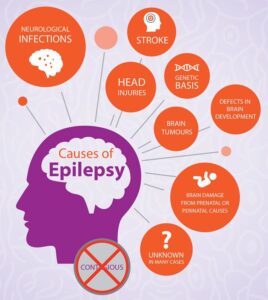
(Image courtesy of Royal Holloway, University of London)
Epilepsy is one of the most common serious neurological conditions affecting close to 65 million people across the world. There are over half a million people with epilepsy in the UK alone, so around 1 in 100 people. It is a common condition that affects the brain and nervous system causing frequent seizures which are brief episodes of involuntary movement in part of the entire body. Seizures can be from the briefest lapses of attention or muscle jerks to severe and prolonged convulsions. The frequency of seizures varies from less than one year to several in a single day. Epilepsy can start at any age but usually starts either in childhood or in people over 60. It’s often lifelong, but can sometimes get slowly better over time. Different epilepsies are due to many different underlying causes. The causes can be complex, and sometimes hard to identify. In over one-third of all people with epilepsy, doctors don’t know the cause, but possible causes of epilepsy include:- Brain damage, for example, damage caused by a stroke, head injury, or infection
- Brain tumours
- The way the brain developed in the womb
- Changes in a person’s genes.
There are over 40 different types of seizures, and not all of them are physical. Seizures can affect people in different ways, depending on which part of the brain is involved. Your brain controls the way you function. Inside your brain, millions of nerve cells (neurons) pass messages via electrical signals to each other. During a seizure, these electrical signals are disrupted and this affects how you feel or what you do while the seizure is happening. Possible symptoms include:
- Uncontrollable jerking and shaking, called a “fit”
- Losing awareness and the person becomes blank and unresponsive for a few seconds.
- Becoming stiff
- Strange sensations, such as a “rising” feeling in the tummy, unusual smells or tastes, and a tingling feeling in your arms or legs, visual disturbances such as coloured or flashing lights
- Collapsing
- Sometimes you might pass out and not remember what happened.
In most cases, it’s not clear why this happens. It’s possible it could be partly caused by your genes affecting how your brain works, as around 1 in 3 people with epilepsy have a family member with it.

Seizures can sometimes have a trigger. Common seizures include stress, lack of sleep, or alcohol. Try to identify any triggers and try to avoid them, i.e. deal with stress, avoid becoming too tired and cut down on alcohol.
How is Epilepsy treated?
It is a lifelong condition, but most people with it can live normal lives if their seizures are well-controlled. Anti-epileptic drugs can be very effective in stopping or reducing the frequency of seizures in around 7 out of 10 people. They do not cure epilepsy but help to stop or reduce the number of seizures, or make them less severe, by changing the chemicals in your brain.
Around a third of people with epilepsy have seizures that don’t stop with epilepsy medication. Their doctor might suggest other types of treatment, including brain surgery, Vagus nerve stimulation, and a special diet called the ketogenic diet.
There are many support groups available for people with epilepsy and online support regarding symptoms, diagnosis, treatments, and more, including some valuable support online from the NHS. Click on this link for more valuable information about Epilepsy: Epilepsy – NHS (www.nhs.uk)
Thank you for taking the time to read this article. If you would like to discuss anything regarding this subject or if you wish to contact Care First 24 for support, please call us on 01732 790001, or email [email protected]. Alternatively visit our website: www.carefirst24.co.uk


